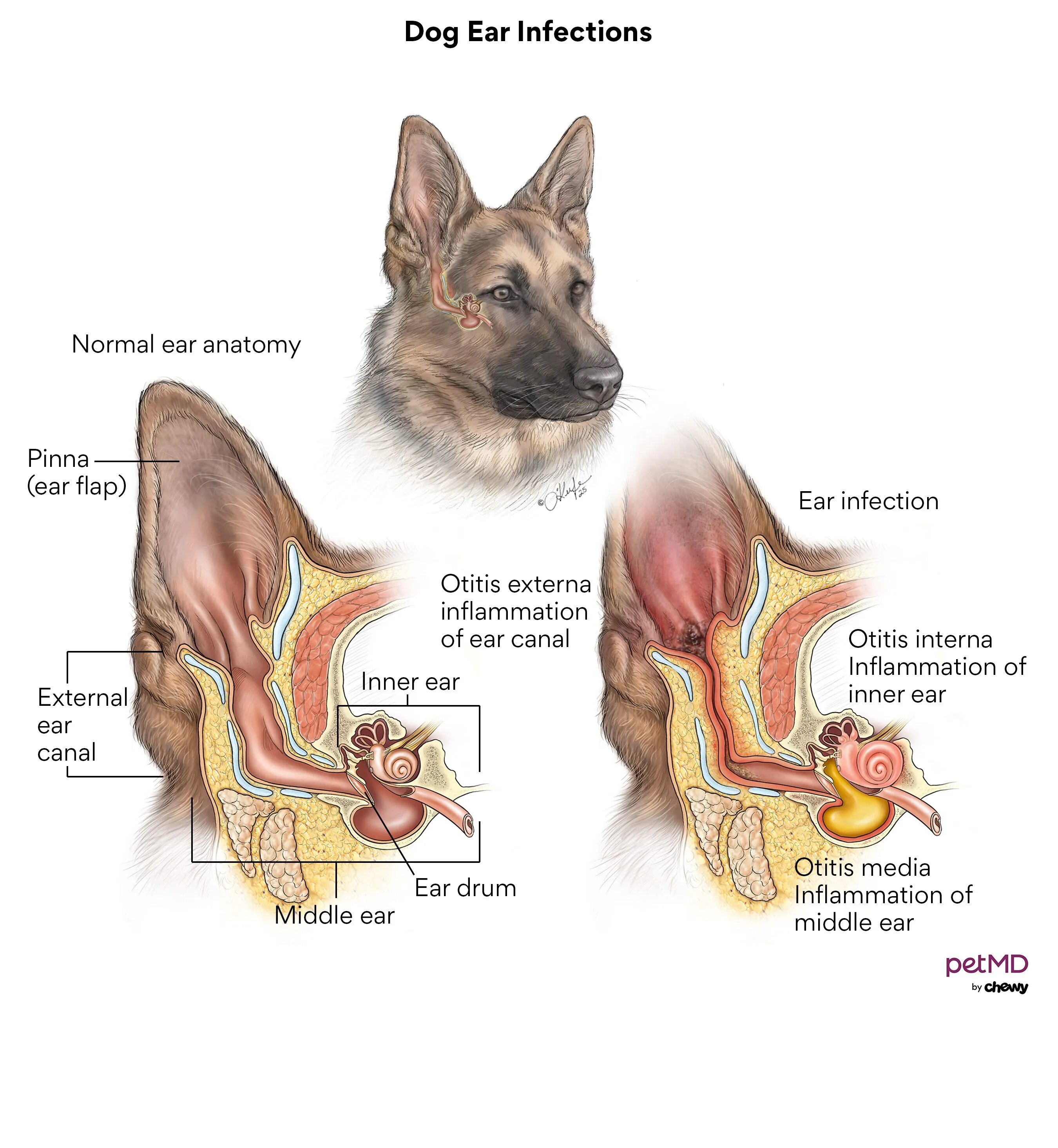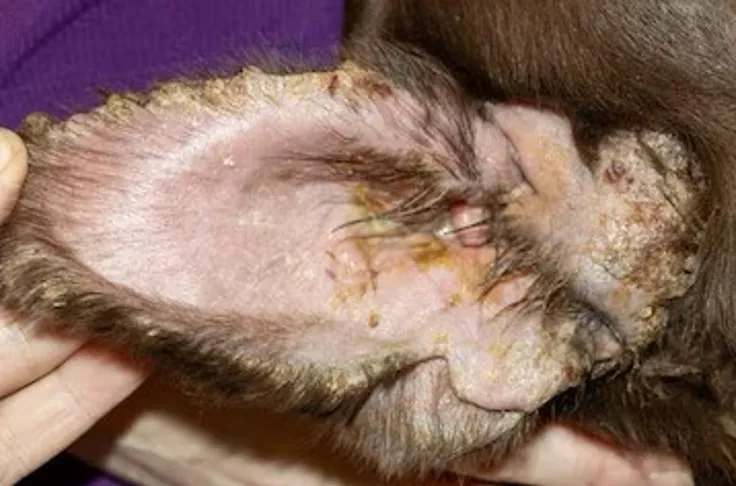Dog ear infections are a common ailment, causing discomfort and pain for our furry companions. As responsible pet owners, understanding how to identify, treat, and prevent these infections is crucial for your dog’s well-being. This guide delves into the intricacies of canine ear infections, providing you with the knowledge to help your dog heal and maintain healthy ears.
Ear infections, particularly otitis externa which affects the outer ear, are a prevalent concern for dogs. While it’s normal for microscopic bacteria and yeast to reside in a dog’s ear canal, an imbalance can occur. This imbalance, often triggered by debris buildup or a compromised ear canal lining, allows these microorganisms to proliferate, leading to infection. Any dog can be susceptible, but certain breeds are more prone due to their ear structure.
Recognizing the Signs of Dog Ear Infections
Early detection is key when it comes to treating ear infections. Familiarize yourself with the common symptoms your dog might exhibit:
- Redness: The ear flap and canal may appear inflamed and red.
- Unpleasant Odor: A distinct yeasty or “corn chip” smell is a tell-tale sign.
- Excessive Itching and Scratching: Your dog will likely paw at their ears or rub them against furniture.
- Pain: Signs of pain can include whimpering, reluctance to be touched near the ears, or even aggression.
- Head Shaking: Frequent and vigorous head shaking is a common response to irritation.
- Head Tilt: Dogs may tilt their head to one side, attempting to find a more comfortable position.
- Discharge: You might notice discharge that can range in color from light yellow to dark brown.
- Crusting or Scabbing: The skin around the ear flap may develop scabs.
- Swelling: The ear flap itself can become swollen, sometimes leading to an aural hematoma (a blood blister).
In more severe cases, your dog might experience temporary hearing loss or balance issues. While rare, systemic effects can impact appetite. Infections can occur in one or both ears.
 A diagram illustrating dog ear infections.
A diagram illustrating dog ear infections.
Understanding the Types of Ear Infections
The anatomy of a dog’s ear is divided into three main areas: the outer ear (ear flap or pinnae and ear canal), the middle ear, and the inner ear. Ear infections are classified by their location:
- Otitis Externa: Inflammation of the ear canal. This is the most common type, as the ear canal is most exposed to external factors.
- Otitis Media: Inflammation of the middle ear.
- Otitis Interna: Inflammation of the inner ear.
Ear infections can be acute, meaning they appear suddenly, or chronic, characterized by recurring episodes.
Yeast vs. Bacterial Ear Infections in Dogs
Differentiating between yeast and bacterial ear infections can be challenging for the untrained eye, as they can appear similar. A veterinarian will take a sample of the ear discharge and examine it under a microscope.
- Yeast infections often present with a distinct odor and a darker, brown discharge.
- Bacterial infections typically have a lighter brown or yellow discharge.
While yeast infections are common in the outer ear, middle and inner ear infections are usually bacterial.
 A dog with a severe ear infection, showing redness, swelling, and pus.
A dog with a severe ear infection, showing redness, swelling, and pus.
Common Causes of Dog Ear Infections
Several factors can predispose a dog to ear infections. The fundamental issue often lies in a compromised natural defense of the ear canal, making it susceptible to infection. Common culprits include:
- Allergies: Environmental or food allergies are a leading cause, creating inflammation that makes the ear canal a breeding ground for yeast and bacteria.
- Moisture: Dogs that swim frequently or have their ears exposed to water are at higher risk.
- Ear Mites: These tiny parasites can irritate the ear canal and lead to secondary bacterial or yeast infections.
- Foreign Bodies: Objects like grass seeds or small debris can get lodged in the ear canal.
- Excessive Hair: Hair growth within the ear canal can trap moisture and debris.
- Underlying Health Conditions: Conditions like hypothyroidism or other endocrine disorders can affect skin health, including the ears.
When a dog experiences significant pain and irritation from an ear infection, they may excessively scratch or shake their head. This can lead to an aural hematoma, where blood vessels in the ear flap rupture, causing swelling and further discomfort.
Diagnosing Ear Infections in Dogs
A thorough diagnosis by a veterinarian is essential for effective treatment. Your vet will likely perform several tests:
- Otoscopic Examination: Using an otoscope, the vet will visually inspect the ear canal and eardrum for inflammation, discharge, and foreign objects.
- Cytology: A swab of ear discharge is stained and examined under a microscope to identify the types of bacteria and yeast present.
- Culture and Sensitivity Testing: This test helps identify the specific bacteria or yeast causing the infection and determines which medications will be most effective.
- Blood Tests: These may be recommended to check for underlying systemic conditions like endocrine diseases that could be contributing to recurrent ear infections.
- Imaging (X-rays, CT, MRI): For severe or chronic infections, or when middle/inner ear involvement is suspected, imaging may be necessary to assess the extent of the disease.
How to Heal an Ear Infection in Dogs: Treatment Options
The treatment for a dog’s ear infection will depend on the diagnosis. It typically involves a multi-pronged approach:
Topical Treatments
- Ear Cleaners: Your vet may prescribe a medicated or non-medicated ear cleaner. These are crucial for removing debris and preparing the ear for medication. Regular cleaning, often daily or every other day, is usually recommended. Always use the cleaner before applying prescribed medications.
- Medicated Ear Drops: These typically contain antibiotics, antifungals, or a combination of both to combat the infection. Some may also include corticosteroids to reduce inflammation and itching. Follow your veterinarian’s instructions for application frequency and duration precisely.
Oral Medications
For more severe infections, or when the infection has spread beyond the outer ear, your vet might prescribe oral medications. These can include:
- Antibiotics: To kill bacteria.
- Antifungals: To combat yeast overgrowth.
- Steroids or Anti-inflammatories: To reduce swelling and pain.
Surgical Intervention
In cases of severe, chronic ear infections where the ear canal has become significantly scarred or narrowed, medical treatments may no longer be effective. Surgery, such as a total ear canal ablation (TECA) and ventral bulla osteotomy (VBO), may be considered to open the ear canal or remove diseased tissue.
Can You Treat Dog Ear Infections Without a Vet?
While over-the-counter medicated ear cleansers might offer some relief for very mild, early-stage infections, they are generally not a substitute for veterinary care. It is crucial to have your veterinarian diagnose the specific cause of the ear infection. Using the wrong treatments can worsen the condition or damage the eardrum. For instance, if the eardrum is ruptured, certain cleaners can cause severe damage to the middle ear.
Recovery and Long-Term Management
Most dogs recover well from ear infections with appropriate treatment. However, for dogs experiencing recurrent infections, further investigation into underlying causes is essential. Long-term management strategies may include:
- Preventative Ear Cleaning: Regular cleaning with a vet-approved product can help maintain ear health.
- Dietary Changes: If allergies are suspected, your vet may recommend a specific diet.
- Medication: In some chronic cases, a vet might prescribe a maintenance medication.
Preventing Dog Ear Infections
Prevention is always better than cure. Incorporate these practices into your dog’s routine:
- Regular Grooming: Keep the hair around and inside your dog’s ear canals trimmed (if applicable to your dog’s breed).
- Routine Ear Cleaning: Clean your dog’s ears regularly, especially if they are prone to infections or enjoy swimming. Use a veterinarian-recommended ear cleaner.
- Dry Ears: Ensure your dog’s ears are thoroughly dried after swimming or bathing.
Regular ear care is particularly important for dogs who love to swim, as water can easily get trapped in their ear canals.
Dog Ear Infections FAQs
Can a dog ear infection heal itself?
Most dog ear infections require veterinary intervention and will not heal on their own. It’s important for a vet to assess the infection and the eardrum’s condition.
What happens if a dog’s ear infection goes untreated?
An untreated ear infection can lead to permanent hearing damage, chronic pain, and can progress to more severe health issues, including systemic illness. Signs of lethargy and loss of appetite can indicate a worsening infection.
Can a dog ear infection spread to a pup’s brain?
While extremely rare, a severe inner ear infection can potentially spread to the brain. This is why prompt and proper treatment is vital.
Are dog ear infections contagious?
Most dog ear infections caused by bacteria or yeast are not contagious. However, if the infection is due to ear mites, these parasites are highly contagious to other pets.
References
- Brooks, W. DVM, DABVP: 9/30/2020 (revised) 1/1/2001 (published). Veterinary Partner, Ear Infections (Otitis) in Dogs.
- Rothrock K. DVM: 5/19/2019 (revised), Morgan, RV. DVM, DACVIM, DACVO: 7/19/2003 (initial author). Veterinary Information Network, VINcyclopedia of Diseases: Otitis Externa, General Information.
